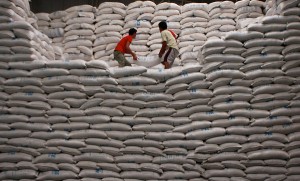MALACAñANG on Wednesday warned that profiteers who will be found to have illegally jacked up the prices of basic agricultural products face imprisonment.
According to Presidential Communications Secretary Herminio Coloma Jr., President Benigno Aquino 3rd has directed the National Price Coordinating Council (NPCC) to meet and discuss the food supply situation and lay out “concrete actions to protect the public from unreasonably high prices.”
“Government is continuing its efforts to ensure stable food supply and prices in the country. The Department of Trade and Industry [DTI] is closely monitoring and conducting surveillance of basic food prices and will strictly enforce anti-profiteering measures on retail outlets,” Coloma said in a press briefing.
The NPCC is made up of representatives from the DTI and Departments of Agriculture, Health, Environment and Natural Resources, Interior and Local Government, Transportation and Communications, Justice, Energy and National Economic Development Authority (NEDA), as well as one representative each from the consumers’ sector, agricultural producers’ sector, trading sector and manufacturers’ sector.
“So what we would like to do is to be able to get inputs from all of the stakeholders in this process and to assure that we have reliable data and information on food supply and food prices,” Coloma said.
The Palace official explained that the NPCC is mandated to curb profiteering at the retail level.
“There are corresponding penalties against it, including imprisonment,” Coloma emphasized.
For one, the official claimed that they are puzzled as to why the price of garlic soared to P300 per kilo when there is a sufficient supply of the commodity.
“On the supply of garlic, based on monitoring done by the Department of Agriculture, as of March this year, the supply of locally produced garlic has reached 8,308 metric tons, which, according to them, is more than adequate to meet the current levels of demand,” Coloma further said.
Although there are indications that some traders may have been hoarding products to jack up prices, Coloma said the NPCC still has to be certain by monitoring the real situation on the ground.
“That is why they are conducting monitoring and surveillance, Ina, to be able to find out if the reported shortage is artificial or if there are manipulative practices that are being committed. NPCC will meet with representatives of the various sectors that I mentioned to be able to size up the situation based on the actual realities on the ground,” said the official.
Besides garlic, Coloma said the council will now be monitoring the prices of rice, sugar and meat products.
Coloma said Malacañang is serious in running after profiteers, especially since the products involved are basic food items.
Speak up
Also on Wednesday, the Kilusang Magbubukid ng Pilipinas (KMP) lamented that the poor are the hardest hit by rising prices and urged the the Catholic Bishops’ Conference of the Philippines (CBCP) to speak up on the issue.
“We call on the Catholic Church hierarchy to speak up against the Aquino regime’s anti-poor food policy. The Filipino peasants, workers, fishers, and the urban poor are the hardest hit by the spikes in food prices brought by Aquino’s rice importation and trade liberalization policy, the removal of regulation and control on prices, its coddling of rice cartels and smugglers, and lack of subsidy to rice farmers,” Rafael Mariano, the group’s chairperson, said.
Mariano dared the CBCP to side with the farmers and the Filipino poor.
“The Aquino government is deceiving the Filipino people. It does not have a concrete solution to the lingering food and hunger problem,” he added, noting that “Malacanang’s prediction of food stability by September is baseless and a mere political pacifier.”
Mariano pointed out that the rice price hikes started in July last year with a P2 to P4 increase driving the price of commercial rice from P32 to P34 to P36. Another wave of price increase happened last September, pegging prices between P38 to P40 per kilo. The recent P2 increase drove the price of commercial rice to P42 per kilo.
The peasant group said hunger incidence will increase in the next few months if prices of basic goods will not go down.
“The rice situation will be worsened by the government’s release into the local market of the 800,000 metric tons of imported rice currently entering our ports. The release of the imported rice, that will eventually fall at the hands of rice cartels, will further push rice prices up,” Mariano said.


